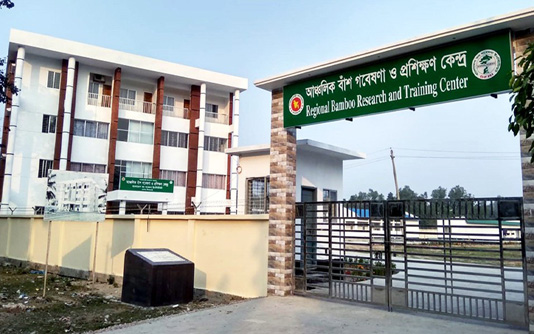RANGPUR, Feb 13, 2020 (BSS) – To bring back the glorious tradition of
bamboo, the Bangladesh Forest Research Institute (BFRI) is set to launch its
Regional Bamboo Research and Training Centre (RBRTC) at Domar upazila of
Nilphamari district on Saturday next.
The BFRI spent Taka 18 crore, including Taka 3.50 crore for construction
of the RBRTC, the first one of its kind in the country, and the rest amount
for establishing modern research laboratory and training facilities, to
restore the lost tradition of bamboo.
“Environment, Forest and Climate Change Minister Md. Shahab Uddin is
expected to inaugurate the newly built RBRTC on Saturday next,” Senior
Research Officer of the BFRI stationed at the RBRTC Md. Anisur Rahman told
BSS.
The RBRTC has been established under the personal guidance of Prime
Minister Sheikh Hasina aiming at conducting scientific research on bamboo and
providing training to farmers to increase bamboo production adopting latest
technologies.
The BFRI began construction of the RBRTC in 2016 and completed the
process in October last much ahead of the scheduled time of December 2020.
Bamboo is generally cultivated from the old mouth of bamboo tree in
Rangpur division.
But, farmers will now cultivate bamboo adopting advanced method by using
‘conch pen’ of bamboo plants instead of old mouth of bamboo tree.
Besides, the RBRTC will provide training to bamboo artisans and expand
commercial production of bamboo and marketing of bamboo-made products and
sophisticated furniture in domestic and international markets.
Bamboo-made furniture are spectacular, attractive and environmentally
friendly having durability of about 25 years and with half manufacturing
costs than wooden furniture.
“By providing training to farmers and bamboo artisans on processing of
bamboo adopting scientific technologies, life expectancy of bamboo and
bamboo-made products will be increased by four to five times,” Rahman said.
It takes at least 40 years for a teak tree to become mature when a
bamboo tree takes only three to four years to mature.
Once, bamboo-made products were being used abundantly in the household,
agriculture and business sectors. The lower and middle class houses were also
made of bamboo.
But, cultivation and production of bamboo has been diminished due to
lack of proper dissemination of newly invented technologies.
“The RBRTC has taken up the task of reviving lost traditions of bamboo,
mainly aiming at benefiting farmers financially by increasing production of
bamboo at reduced costs,” Rahman said.
Talking to BSS, bamboo artisan Ashraf Ali, 66, of Boragari union in
Domar upazila said, once the bamboo industry was found in almost every
village. But, plastic products have captured the place of eco-friendly
bamboo-made products.
“The bamboo industry is on the verge of extinction now due to lack of
capital, increase in wages of workers and easier availability of plastic
products at lowest costs,” Ali said.
However, there is still a huge demand for bamboo products in rural
areas.
“In addition to men, many women were involved in producing bamboo-made
and cane-made household goods to sell those in the local markets in the
past,” he said.
In the course of time, bamboo or cane artisans and workers are failing
to retain their ancestral profession and bamboo-based cottage industry.
“As a result, many bamboo artisans and workers have left their ancestral
profession,” he said, hoping that the RBRTC will be able to bring back the
past glory of eco-friendly bamboo-made household goods and furniture.



